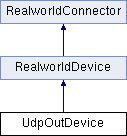UdpOutDevice Class Reference
UdpOutDevice is a pseudo interface that allows communcation with the real world through the UdpOutScheduler. More...
#include <UdpOutDevice.h>
Inheritance diagram for UdpOutDevice:

Protected Member Functions | |
| virtual char * | encapsulate (cPacket *msg, unsigned int *length, sockaddr **addr, socklen_t *addrlen) |
| Converts an IP datagram to a data block for sending it to the (realworld) network. | |
| virtual cPacket * | decapsulate (char *buf, uint32_t length, sockaddr *addr, socklen_t addrlen) |
| Parses data received from the (realworld) network and converts it into a cMessage. | |
 Protected Member Functions inherited from RealworldDevice Protected Member Functions inherited from RealworldDevice | |
| InterfaceEntry * | registerInterface () |
| Register the interface in the interface table of the parent. | |
 Protected Member Functions inherited from RealworldConnector Protected Member Functions inherited from RealworldConnector | |
| virtual void | transmitToNetwork (cPacket *msg) |
| Send a message to the (realworld) network. | |
| virtual void | updateDisplayString () |
| virtual bool | isApp () |
| If the Connector connects to an application, this method has to be overwritten to return "true". | |
Additional Inherited Members | |
 Public Member Functions inherited from RealworldDevice Public Member Functions inherited from RealworldDevice | |
| virtual int | numInitStages () const |
| virtual void | initialize (int stage) |
| Initialization of the module. | |
 Protected Attributes inherited from RealworldDevice Protected Attributes inherited from RealworldDevice | |
| InterfaceEntry * | interfaceEntry |
Detailed Description
UdpOutDevice is a pseudo interface that allows communcation with the real world through the UdpOutScheduler.
WARNING: This does ONLY work with the combination IPv4|UDP|OverlayMessage
Definition at line 36 of file UdpOutDevice.h.
Member Function Documentation
|
protectedvirtual |
Parses data received from the (realworld) network and converts it into a cMessage.
- Parameters
-
buf A pointer to the data to be parsed length The lenght of the buffer in bytes addr The destination address addrlen The length of the address
- Returns
- The parsed message
Implements RealworldConnector.
Definition at line 109 of file UdpOutDevice.cc.
{
if (!addr) {
opp_error("UdpOutDevice::decapsulate called without providing "
"sockaddr (addr = NULL)");
}
if (addrlen != sizeof(sockaddr_in) ) {
opp_error("UdpOutDevice::decapsulate called with wrong sockaddr length. "
"Only IPv4 is supported at the moment!");
}
sockaddr_in* addrbuf = (sockaddr_in*) addr;
IPDatagram* IP = new IPDatagram;
UDPPacket* UDP = new UDPPacket;
cPacket* payload = 0;
// Parse Payload
payload = parser->decapsulatePayload(buf, length);
if (!payload) {
EV << "[UdpOutDevice::decapsulate()]\n"
<< " Parsing of payload failed, dropping packet"
<< endl;
goto parse_error;
}
// Create IP + UDP header
IP->setSrcAddress(IPAddress(ntohl(addrbuf->sin_addr.s_addr)));
IP->setDestAddress(IPAddressResolver().addressOf(getParentModule()).get4());
IP->setTransportProtocol(IPPROTO_UDP);
IP->setTimeToLive(42); // Does not matter, packet ends here
IP->setIdentification(42); // Faked: There is no way to get the real ID
IP->setMoreFragments(false);
IP->setDontFragment(false);
IP->setFragmentOffset(0);
IP->setDiffServCodePoint(0); // Faked...
IP->setBitLength(160);
UDP->setSourcePort(ntohs(addrbuf->sin_port));
UDP->setDestinationPort(getParentModule()->getSubmodule("overlay", 0)->
gate("appIn")->getNextGate()->getOwnerModule()->
par("localPort").longValue());
UDP->setByteLength(8);
// Done...
UDP->encapsulate(payload);
IP->encapsulate(UDP);
delete[] buf;
delete addr;
return IP;
parse_error:
delete IP;
delete UDP;
delete[] buf;
delete addr;
delete payload;
return NULL;
}
|
protectedvirtual |
Converts an IP datagram to a data block for sending it to the (realworld) network.
- Parameters
-
msg A pointer to the message to be converted length A pointer to an int that will hold the length of the converted data addr The destination address addrlen The length of the address
- Returns
- A pointer to the converted data
Implements RealworldConnector.
Definition at line 36 of file UdpOutDevice.cc.
{
cPacket* payloadMsg = NULL;
char* payload = NULL;
sockaddr_in* addrbuf = NULL;
unsigned int payloadLen;
IPDatagram* IP = check_and_cast<IPDatagram*>(msg);
// FIXME: Cast ICMP-Messages
UDPPacket* UDP = dynamic_cast<UDPPacket*>(IP->decapsulate());
if (!UDP) {
EV << "[UdpOutDevice::encapsulate()]\n"
<< " Can't parse non-UDP packets (e.g. ICMP) (yet)"
<< endl;
goto parse_error;
}
// TODO(?) Handle fragmented packets
if( IP->getMoreFragments() ) {
EV << "[UdpOutDevice::encapsulate()]\n"
<< " Can't parse fragmented packets"
<< endl;
goto parse_error;
}
payloadMsg = UDP->decapsulate();
// parse payload
payload = parser->encapsulatePayload(payloadMsg, &payloadLen);
if (!payload) {
EV << "[UdpOutDevice::encapsulate()]\n"
<< " Can't parse packet payload, dropping packet"
<< endl;
goto parse_error;
}
if (payloadLen > mtu) {
EV << "[UdpOutDevice::encapsulate()]\n"
<< " Encapsulating packet failed: packet too long"
<< endl;
goto parse_error;
}
*length = payloadLen;
// create sockaddr
addrbuf = new sockaddr_in;
addrbuf->sin_family = AF_INET;
addrbuf->sin_port = htons(UDP->getDestinationPort());
addrbuf->sin_addr.s_addr = htonl(IP->getDestAddress().getInt());
*addrlen = sizeof(sockaddr_in);
*addr = (sockaddr*) addrbuf;
delete IP;
delete UDP;
delete payloadMsg;
return payload;
parse_error:
delete IP;
delete UDP;
delete payloadMsg;
delete payload;
return NULL;
}
The documentation for this class was generated from the following files:
